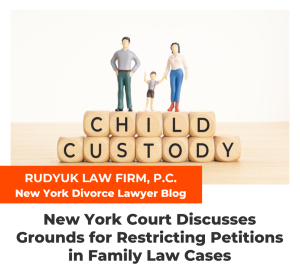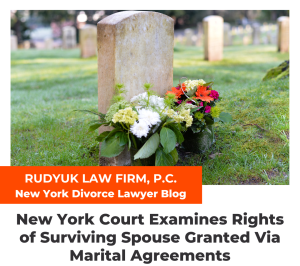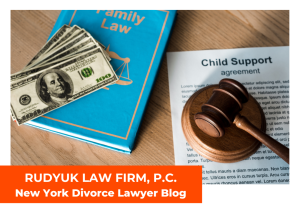 Custody disputes rarely remain static after a divorce is finalized. Changes in a parent’s mental health, parenting involvement, or the child’s needs can quickly raise serious questions about whether an existing custody arrangement still serves the child’s best interests. A recent New York decision reinforces a critical principle of New York family law: when a parent presents sufficient evidence of changed circumstances affecting a child’s welfare, courts must permit a full hearing rather than dismiss the request outright. If you are seeking to modify custody or defending against a modification petition, it is essential to talk to an experienced New York child custody attorney about how you can protect both your parental rights and your child’s well-being.
Custody disputes rarely remain static after a divorce is finalized. Changes in a parent’s mental health, parenting involvement, or the child’s needs can quickly raise serious questions about whether an existing custody arrangement still serves the child’s best interests. A recent New York decision reinforces a critical principle of New York family law: when a parent presents sufficient evidence of changed circumstances affecting a child’s welfare, courts must permit a full hearing rather than dismiss the request outright. If you are seeking to modify custody or defending against a modification petition, it is essential to talk to an experienced New York child custody attorney about how you can protect both your parental rights and your child’s well-being.
History of the Case
It is reported that the parties divorced in 2019 pursuant to a judgment incorporating a prior stipulation granting the father joint legal custody and primary residential custody. The custody arrangement was later modified by a court-approved stipulation entered in 2021.
Allegedly, in 2024, the father filed a petition seeking sole legal and residential custody of the child, while the mother filed a cross-petition requesting increased parental access and expanded decision-making authority. The trial court issued an order prohibiting the father from filing any further custody-related petitions without prior written permission and dismissed his modification petition without conducting a hearing. The father appealed both determinations.
 New York Divorce Lawyer Blog
New York Divorce Lawyer Blog











 Family law disputes do not always end with divorce or death. In many cases, unresolved marital agreements resurface after a spouse passes away, placing surviving family members in prolonged litigation. A recent New York
Family law disputes do not always end with divorce or death. In many cases, unresolved marital agreements resurface after a spouse passes away, placing surviving family members in prolonged litigation. A recent New York  In New York divorce litigation, the threshold question of whether a valid marriage exists can be outcome-determinative. When parties participate in a religious ceremony without obtaining a marriage license, courts must carefully assess whether the ceremony satisfies statutory requirements for a legally recognized marriage. A recent
In New York divorce litigation, the threshold question of whether a valid marriage exists can be outcome-determinative. When parties participate in a religious ceremony without obtaining a marriage license, courts must carefully assess whether the ceremony satisfies statutory requirements for a legally recognized marriage. A recent  In New York child support cases, it is not uncommon for one parent to request an upward modification if they believe the other parent’s income has increased. However, courts require clear, specific proof before altering an existing support order. A recent New York
In New York child support cases, it is not uncommon for one parent to request an upward modification if they believe the other parent’s income has increased. However, courts require clear, specific proof before altering an existing support order. A recent New York  In interstate and international custody disputes, even the most urgent requests can be denied if the court lacks proper jurisdiction over a parent. In other words, procedural rules governing service of process and notice are not mere technicalities but fundamental safeguards that ensure fairness and due process. A recent New York
In interstate and international custody disputes, even the most urgent requests can be denied if the court lacks proper jurisdiction over a parent. In other words, procedural rules governing service of process and notice are not mere technicalities but fundamental safeguards that ensure fairness and due process. A recent New York  In New York family law, few issues are as emotionally charged as disputes over a parent’s right to consent to a child’s adoption. When a parent has been absent from a child’s life for years, courts must weigh the child’s stability, safety, and emotional needs against the parental rights of a biological parent seeking renewed involvement. A recent New York
In New York family law, few issues are as emotionally charged as disputes over a parent’s right to consent to a child’s adoption. When a parent has been absent from a child’s life for years, courts must weigh the child’s stability, safety, and emotional needs against the parental rights of a biological parent seeking renewed involvement. A recent New York 